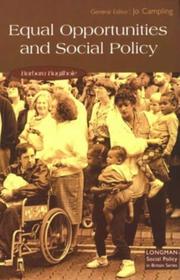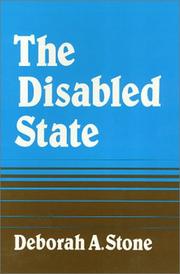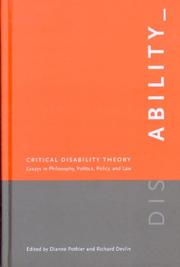| Listing 1 - 10 of 12 | << page >> |
Sort by
|

ISBN: 9789076871684 907687168X 908952049X Year: 2006 Publisher: Groningen Europa Law Publishing
Abstract | Keywords | Export | Availability | Bookmark
 Loading...
Loading...Choose an application
- Reference Manager
- EndNote
- RefWorks (Direct export to RefWorks)
Social policy and particular groups --- European law --- Human rights --- Social law. Labour law --- European Union --- People with disabilities - Legal status, laws, etc. - European Union countries - History. --- People with disabilities - Government policy - European Union countries - History. --- People with disabilities
Book
ISBN: 1447351290 1447351274 1447351282 Year: 2023 Publisher: Bristol : Policy Press,
Abstract | Keywords | Export | Availability | Bookmark
 Loading...
Loading...Choose an application
- Reference Manager
- EndNote
- RefWorks (Direct export to RefWorks)
What is the social cost of privatising public services? And what effect has the failure of previous privatisations had? This book tells how social work services are now being out-sourced to private companies and how this trend threatens the safety and wellbeing of vulnerable children and disabled adults.
Privatization. --- Social services: contracting out. --- People with disabilities: government policy. --- Abused children: government polic --- Social services: government policy. --- Child welfare: government policy. --- Denationalization --- Privatisation --- Contracting out --- Corporatization --- Government ownership --- Abused children --- People with disabilities --- Social service --- Services for --- Government policy
Book
ISBN: 1316255379 1316234568 1316236455 1316253473 1316249697 1107627168 1316251586 1316247791 131624590X 1107278805 1107049172 1322882347 9781107049178 9781107278806 9781107627161 Year: 2015 Publisher: Cambridge Cambridge University Press
Abstract | Keywords | Export | Availability | Bookmark
 Loading...
Loading...Choose an application
- Reference Manager
- EndNote
- RefWorks (Direct export to RefWorks)
This book explores the status and scope of family policies related to households of children with disabilities, providing an in-depth, evidence-based review of legal, programmatic issues. It includes a discussion of the gaps between family needs and contemporary family policies in the United States and European countries, as demonstrated in these households' surveys. In addition, the volume offers a comparative analysis of cash benefits, tax credits and deductions, and in-kind provisions between the United States and select European countries (UK, France, and Sweden). Most importantly, this book identifies and continues the discussion regarding the critical role of family-centered policies, as expressed in the United Nations Convention on the Rights of Persons with Disabilities (UNCRPD), as well as the future of family policy toward families of children with disabilities at a time of economic crisis.
Parents of children with disabilities --- People with disabilities --- Disability law --- Cripples --- Disabled --- Disabled people --- Disabled persons --- Handicapped --- Handicapped people --- Individuals with disabilities --- People with physical disabilities --- Persons with disabilities --- Physically challenged people --- Physically disabled people --- Physically handicapped --- Persons --- Disabilities --- Sociology of disability --- Parents of handicapped children --- Children with disabilities --- Services for. --- Government policy --- Legal status, laws, etc. --- Parents of children with disabilities - Services for --- People with disabilities - Government policy - United States --- People with disabilities - Government policy - Europe --- People with disabilities - Legal status, laws, etc. --- Etats-Unis --- Royaume-Uni --- France --- Suède

ISBN: 0582279518 9780582279513 Year: 1997 Volume: *1 Publisher: London Longman
Abstract | Keywords | Export | Availability | Bookmark
 Loading...
Loading...Choose an application
- Reference Manager
- EndNote
- RefWorks (Direct export to RefWorks)
In dit boek wordt het concept 'gelijke kansen' en het gelijkekansenbeleid dat daarop gebaseerd is in Groot-Brittannie, doorgelicht voor drie onderscheiden categorieën : vrouwen, etnische minderheden en gehandicapten. Ondanks de onderlinge verschillen in discriminatie en uitsluiting hebben deze drie groepen met elkaar gemeen dat ze uiterst gevoelig zijn voor veranderingen op het terrein van sociale voorzieningen. Een vijftal domeinen worden bekeken : onderwijs, werkgelegenheid, gezondheidszorg, welzijnswerk en wonen.
Social stratification --- Great Britain --- Equality --- Women --- Minorities --- People with disabilities --- Government policy --- Social policy --- Equality - Great Britain. --- Women - Government policy - Great Britain. --- Minorities - Government policy - Great Britain. --- People with disabilities - Government policy - Great Britain. --- Race --- Disability --- Equal opportunities --- Gender --- Healthcare --- Education --- Welfare work --- Employment opportunities --- Legislation --- Book

ISBN: 9041115919 9789041115911 Year: 2001 Publisher: The Hague Kluwer law international
Abstract | Keywords | Export | Availability | Bookmark
 Loading...
Loading...Choose an application
- Reference Manager
- EndNote
- RefWorks (Direct export to RefWorks)
Social security beneficiaries --- People with disabilities --- Government policy --- 32-056.26 <4> --- 35.073.1 --- Politiek. Staatskunde. Staatswetenschappen --(algemeen)--?-056.26--Europa --- Burgerrechtelijke, juridische gevolgen van overheidsbeslissingen --- 35.073.1 Burgerrechtelijke, juridische gevolgen van overheidsbeslissingen --- 32-056.26 <4> Politiek. Staatskunde. Staatswetenschappen --(algemeen)--?-056.26--Europa --- Social security beneficiaries - Europe. --- People with disabilities - Government policy - Europe.

ISBN: 9781841134864 1841134864 Year: 2005 Publisher: Oxford ; Portland, Or. : Hart Pub.,
Abstract | Keywords | Export | Availability | Bookmark
 Loading...
Loading...Choose an application
- Reference Manager
- EndNote
- RefWorks (Direct export to RefWorks)
People with disabilities - Legal status, laws, etc - Europe --- People with disabilities - Civil rights - Europe --- People with disabilities - Government policy - Europe --- Human rights - Europe --- People with disabilities --- Human rights --- Handicapés --- Droits de l'homme (Droit international) --- Legal status, laws, etc. --- Civil rights --- Government policy --- Droit --- Droits --- Politique gouvernementale

ISBN: 0226767329 0226767310 9786612679322 0226767302 1282679325 Year: 2006 Publisher: Chicago University of Chicago press
Abstract | Keywords | Export | Availability | Bookmark
 Loading...
Loading...Choose an application
- Reference Manager
- EndNote
- RefWorks (Direct export to RefWorks)
In Cultural Locations of Disability, Sharon L. Snyder and David T. Mitchell trace how disabled people came to be viewed as biologically deviant. The eugenics era pioneered techniques that managed ""defectives"" through the application of therapies, invasive case histories, and acute surveillance techniques, turning disabled persons into subjects for a readily available research pool. In its pursuit of normalization, eugenics implemented disability regulations that included charity systems, marriage laws, sterilization, institutionalization, and even extermination. Enacted in enclos
#SBIB:39A9 --- #SBIB:316.8H11 --- Medische antropologie / gezondheid / handicaps --- Welzijns- en sociale problemen: gehandicapten (fysiek, mentaal) --- People with disabilities in motion pictures. --- People with disabilities --- Sociology of disability. --- Geschiedenis van opvoeding en onderwijs --- Government policy. --- Social conditions. --- handboeken en inleidingen --- People with disabilities - Government policy. --- People with disabilities -- Government policy. --- People with disabilities - Social conditions. --- People with disabilities -- Social conditions. --- Persons --- History --- Socioeconomic Factors --- Sociology --- Social Conditions --- Disabled Persons --- Eugenics --- Named Groups --- Humanities --- Population Characteristics --- Social Sciences --- Anthropology, Education, Sociology and Social Phenomena --- Health Care --- Social Welfare & Social Work --- Disabilities --- handboeken en inleidingen. --- Handboeken en inleidingen. --- People with disabilities in motion pictures --- Sociology of disability --- Sociology of disablement --- Sociology of impairment --- Cripples --- Disabled --- Disabled people --- Disabled persons --- Handicapped --- Handicapped people --- Individuals with disabilities --- People with physical disabilities --- Persons with disabilities --- Physically challenged people --- Physically disabled people --- Physically handicapped --- Handicapped in motion pictures --- Motion pictures --- Government policy --- Social conditions --- Sociological aspects
Book
ISBN: 9780745634869 9780745634852 0745634869 0745634850 Year: 2010 Publisher: Cambridge Polity
Abstract | Keywords | Export | Availability | Bookmark
 Loading...
Loading...Choose an application
- Reference Manager
- EndNote
- RefWorks (Direct export to RefWorks)
People with disabilities --- Sociology of disability --- Disabilities --- Sociology of disablement --- Sociology of impairment --- Cripples --- Disabled --- Disabled people --- Disabled persons --- Handicapped --- Handicapped people --- Individuals with disabilities --- People with physical disabilities --- Persons with disabilities --- Physically challenged people --- Physically disabled people --- Physically handicapped --- Persons --- Government policy --- Research --- Sociological aspects --- Sociology of health --- Social problems --- Social policy and particular groups --- People with disabilities - Research --- People with disabilities - Government policy --- Handicap --- Aspect social

ISBN: 0877223599 0877223629 9780877223627 9780877223597 Year: 1984 Volume: SOCIETY, AND POLICY Publisher: Philadelphia Temple University Press
Abstract | Keywords | Export | Availability | Bookmark
 Loading...
Loading...Choose an application
- Reference Manager
- EndNote
- RefWorks (Direct export to RefWorks)
Disability insurance --- Disability evaluation --- People with disabilities --- Government policy --- Disability insurance. --- Disability evaluation. --- #SBIB:316.8H40 --- #SBIB:316.8H11 --- Cripples --- Disabled --- Disabled people --- Disabled persons --- Handicapped --- Handicapped people --- Individuals with disabilities --- People with physical disabilities --- Persons with disabilities --- Physically challenged people --- Physically disabled people --- Physically handicapped --- Persons --- Disabilities --- Sociology of disability --- Disability rating --- Estimation of disability --- Estimation of incapacity --- Incapacity, Estimation of --- Diagnosis --- Evaluation --- Industrial accidents --- Disability income insurance --- Insurance, Disability --- Invalidity insurance --- Insurance --- Government policy. --- Sociaal beleid: social policy, sociale zekerheid, verzorgingsstaat --- Welzijns- en sociale problemen: gehandicapten (fysiek, mentaal) --- People with disabilities - Government policy

ISBN: 9780774812030 0774812036 0774812044 9780774812047 9780774851695 0774851694 1282740784 9786612740787 9781282740785 6612740787 Year: 2006 Publisher: Vancouver, B.C.
Abstract | Keywords | Export | Availability | Bookmark
 Loading...
Loading...Choose an application
- Reference Manager
- EndNote
- RefWorks (Direct export to RefWorks)
People with disabilities in Canada inhabit a system of deep structural, economic, social, political, legal, and cultural inequality -- a regime of dis-citizenship. Despite the widespread belief that Canada is a country of liberty, equality, and inclusiveness, many persons with disabilities experience social exclusion and marginalization. They are socially constructed as second-class citizens. Conventional understandings of disability are dependent on assumptions that characterize disability as misfortune and by implication privilege the "normal" over the "abnormal." Consequently, it is presumed that societal organization based upon able-bodied and -minded norms is inevitable and that the best we can do is show sympathy or pity. The essays Critical Disability Theory contend instead that achieving equality for the disabled is not fundamentally a question of medicine or health, nor is it an issue of sensitivity or compassion. Rather, it is a question of politics, and of power and powerlessness. This book argues that we need new ways to think about the nature of disability, a new understanding of participatory citizenship that encompasses the disabled, new policies to respond to their needs, and a new vision of their entitlements. Twenty-four scholars from a variety of disciplines come together here to identify the problems with traditional approaches to disability and to provide new directions. The essays range from focused empirical and experiential studies of different disabilities, to policy analyses, legal interrogations, and philosophical reconsiderations. The result will be of interest to policy makers, professionals, academics, non-governmental organizations, and grassroots activists.
Disability studies --- People with disabilities --- Discrimination against people with disabilities --- Government policy --- Legal status, laws, etc --- #SBIB:39A9 --- Discrimination against the handicapped --- Cripples --- Disabled --- Disabled people --- Disabled persons --- Handicapped --- Handicapped people --- Individuals with disabilities --- People with physical disabilities --- Persons with disabilities --- Physically challenged people --- Physically disabled people --- Physically handicapped --- Persons --- Disabilities --- Sociology of disability --- Education --- Legal status, laws, etc. --- Medische antropologie / gezondheid / handicaps --- Study and teaching --- Curricula --- Ableism --- Disability studies - Canada --- People with disabilities - Canada --- People with disabilities - Government policy - Canada --- People with disabilities - Legal status, laws, etc - Canada --- Discrimination against people with disabilities - Canada --- Droit médical
| Listing 1 - 10 of 12 | << page >> |
Sort by
|

 Search
Search Feedback
Feedback About UniCat
About UniCat  Help
Help News
News